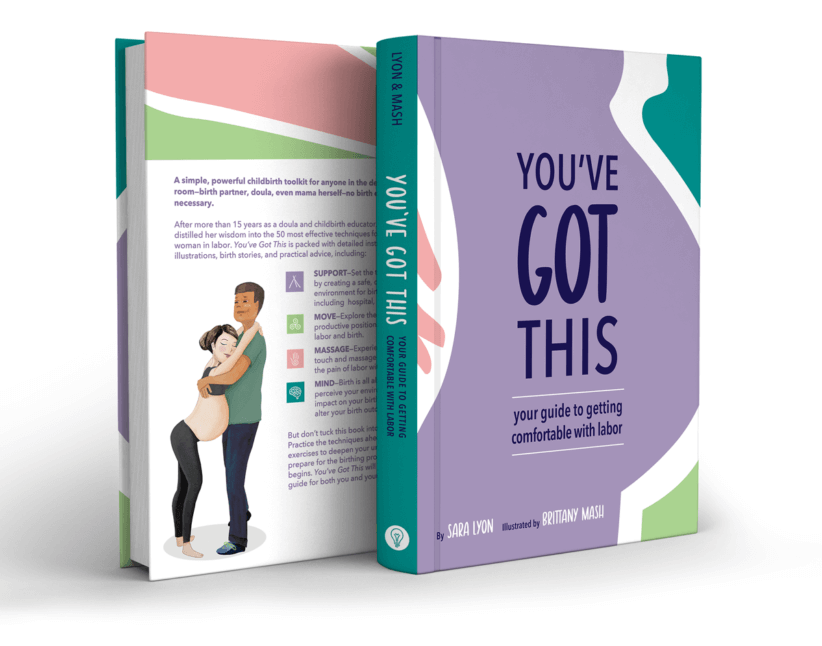
Given the archetypal “grin and bear it” mentality we have towards women’s health, it’s on brand for America to have the lowest rates of satisfaction in childbirth of all developed countries. In the U.S., birthing families are responsible for providing their own labor support, whether that be through a midwife, doula or partner. This support isn’t built into the system, and it’s not built into society. I’m not talking about medical care, I’m talking about small but immensely impactful comfort measures that can prevent decades of PTSD. It’s crucial that you and your partner get serious about birth support, especially in New York City, where C-Section rates are particularly high.
The good news is, effective birth support is something all of us can provide with just a little education and practice. As a birth educator and doula of 15 years, I’ve seen partners step up and into the primary support role after just one class.
Why does it matter? The long-term consequences of a negative birth experience cost a lot more than a doula: Increased risk for depression, anxiety and PTSD and reduced mother-infant bonding, and fear of future childbirth. The ways that we feel about our bodies, babies, sexuality and motherhood are impacted by our birth experiences. In short, birth matters!
What can you do? Numerous studies have concluded that respectful practitioners, a safe and comfortable birth environment, and a sense of being in control are associated with mothers’ satisfaction during labor. Respect, safety and control; this is where your partner can shine! Your partner’s primary responsibility is gatekeeping your labor experience. By managing your immediate sensory environment with care, and meeting your needs selflessly, your partner can significantly improve your likelihood of feeling empowered.
If you’re pregnant, offer this article to your partner, or use the following guide as a script to open up dialogue about support in the birth room:
Bring the Medical Team Onside
Partner, your first job is to familiarize yourself with the medical team once you’ve arrived at your labor room. Lead with gratitude; remember that most of the patient-facing roles require long hours in very intense physical and emotional conditions. Introduce yourself and your laboring partner; learn the staff’s names, and let them know how much you appreciate their care in advance.
Offer the Labor and Delivery nurses an endearing gift that will automatically increase their patience for you and your needs; something delicious from the shelves above Trader Joe’s dessert freezer will do the job well. Alternatively, write a ‘Thank You’ card ahead of time and give it to the nursing team when you’re admitted to your room.
By communicating your appreciation, you’ve set the stage for mutual respect. If you approach the hospital environment like a machine, and treat the staff like cogs, they will reciprocate. Be human and expect to be treated humanely.
Manage the Environment
During labor, a woman’s senses are on high alert, scanning the environment for threats. The brain translates bright lights, loud sounds and bad smells into meaningful danger, so notice what’s happening around you and think about it from this perspective. Adrenaline stops contractions, making it harder to birth vaginally. Think dark, cozy cave and you’re on the right track.
The birth environment is an easy place to make changes that will reduce her stress levels, and increase her sense of safety. Once you’ve met the medical team, take a moment to scan the labor and delivery room. Look for bright lights, and dim or turn them off or close the blinds. If you hear medical staff speaking loudly in your room, explain that the noise is distressing to your laboring partner, and kindly ask for quiet. Bring the birthing person’s favorite essential oil, and dab it on a washcloth placed near her head.
Center Her Needs
While women in labor want to know they’re in good hands, they don’t like to feel actively observed. You can help your birthing partner by being fully present and available for her needs, sideling your own.
Try to anticipate her needs by doing thoughtful things that will make a huge difference:
-Packing food for both of you so that you don’t have to leave the room to go to the cafeteria
-Always having water close by and monitoring her intake from the onset of labor
-Asking the labor and delivery team where you can get ice and a washcloth should she get hot
-Noticing if her lips are chapped from heavy breathing through contractions, and offering her lip balm
Remember that this experience is not about you, so don’t take anything personally. The intensity of labor will require all of the birthing woman’s focus, thus she will not be thinking about you, nor should she. Think of yourself as a NASCAR pit mechanic – it’s all about the car and the driver/mom and the baby. If she asks you to press harder, press harder; if she asks you to stop, stop; if she asks you to quiet down; be silent. Don’t be offended by these requests – she is managing the biggest job of her life, and your role is to support her.
Consider Hiring a Doula
To most of us, the medical environment is a daunting, foreign land. With an unfamiliar vocabulary, a unique power structure, and specific protocols, it’s easy to feel lost. A doula is like a trailguide for your birth experience, helping you navigate the terrain from home to hospital to home again. Empirical data shows that doulas reduce the length of labor, need for pain medication, and likelihood of a C-Section for all demographics, but marginalized populations, in particular, should seriously consider hiring a doula to assist with advocacy.
The first person someone in labor looks to for confidence is her partner. Nothing replaces a supportive partner, not even the presence of an expert doula, so take your role seriously. Birth preparation isn’t just informational, it’s also emotional. Your investment in learning will have a long-term impact on your family – it’s worth it!

Sara Lyon is a birth educator and doula of 15 years, a mother of two, and a resident of the UWS. You can learn from her at www.thebirthdeck.com and purchase her books, You’ve Got This and The Birth Deck, on Amazon.
















